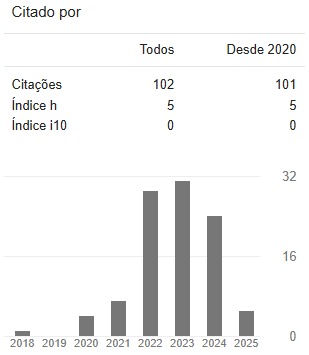Das curiosidades e epistemologias à luz de Paulo Freire
DOI:
https://doi.org/10.35642/rm.v8i1.1389Palavras-chave:
Epistemologia, Teoria do Conhecimento, Teoria Crítica, Institutos Federais, Paulo FreireResumo
O objetivo do artigo é pensar em elementos sociais e epistêmicos à luz dos argumentos centrais de Paulo Freire, sobretudo os que tangem as questões entre a cultura da técnica e a pedagogia emancipadora. Por essa razão, examinam-se algumas funções dos Institutos Federais no Brasil, na medida mesma em que estão abertas às perspectivas pedagógicas-transversais e político-sociais, segundo suas próprias diretrizes. Em paralelo a essa abordagem, apresentam-se alguns elementos teóricos de dois pensadores da epistemologia (Thomas Kunh e Gaston Bachelard) e suas contribuições para teoria do conhecimento e para a filosofia da ciência. A investigação segue a premissa de que tanto as “relações sociais” quanto as “identidades culturais” podem ser cultivadas por diferentes abordagens simétricas e sociais dentro das epistemologias ativas e libertadoras que objetivam abrir espaço e aproximação às teses vinculadas à teoria do conhecimento freireano que revolucionou uma quantidade considerável de critérios de aprendizagem no Brasil e no mundo. A abordagem metodológica é, por isso, indutiva/qualitativa. O problema que se apresenta é: saber se, a partir do cumprimento das diretrizes dos Institutos Federais de Educação, a dinâmica transversal da educação (que deseja emancipar o discente) permite propor um diálogo permanente entre os conteúdos necessários para aprendizagem e a autonomia discente inegociável para o alcance da sua cidadania e da sua cultura. O resultado final dessa pesquisa tenta indagar – aqui e cada vez mais – se o papel da teoria do conhecimento pode ser ambivalente de modo a trabalhar (unir) tanto o desenvolvimento epistêmico quanto o pensamento crítico? Destarte, o texto trabalha algumas contribuições da filosofia de Paulo Freire como um grande pilar da formação do corpo discente, para revelar – alhures – que toda criação requer, do discente, um pouco de coragem e autonomia.
Downloads
Referências
ARENDT, Hanna. A condição humana. Trad. Roberto Raposo, 10a Ed., Rio de Janeiro: Forense Universitária, 2007.
BACHELARD, Gaston. A formação do espírito científico: contribuição para uma psicanálise do conhecimento. Trad. Estela dos Santos Abreu. Rio de Janeiro: Contraponto, 1996.
BRASIL. Lei nº 11.892/2008, de 29 de dezembro de 2008. Institui a Rede Federal de Educação Profissional, Científica e Tecnológica, cria os Institutos Federais de Educação,Ciência e Tecnologia. Diário Oficial da União, Brasília, DF, 30dez. 2008. Disponível em: http://www.planalto.gov.br/ccivil_03/_ato2007-2010/2008/lei/l11892.htm. Acesso em: 28 abr. 2024.
BRASIL. Um novo modelo em educação profissional e tecnológica: Concepção e Diretrizes. Ministério da Educação. Instituto Federal de Educação, Ciência e Tecnologia, v. 1, 2010. Disponível em: http://portal.mec.gov.br/index.php?option=com_docman&view=download&alias=6691-ifconcepcaoediretrizes&category_slug=setembro-2010-pdf&Itemid=30192. Acesso em: 28 abr. 2024.
COMENIO, João Amós. Didáctica Magna: tratado da arte universal de ensinar tudo a todos. Trad. Joaquim Ferreira Gomes. 4ª edição. Lisboa: Fundação Calouste Gulbenkian, 1996.
FREIRE, Paulo. Pedagogia da Autonomia: Saberes necessários à prática educativa. São Paulo: Paz e Terra, 1996. (Coleção Leitura).
FREIRE, Paulo. Pedagogia da indignação: cartas pedagógicas e outros escritos. São Paulo: Editora, UNESP, 2000.
HABERMAS, Jürgen. Técnica e Ciência enquanto ‘ideologia’. In: Textos Escolhidos. Luís J. Baraúna e trad. São Paulo: Ed. Victor Civita. pp. 313 – 343, 1983. (Col. Os Pensadores).
HORKHEIMER, Marx. Dialética do Esclarecimento. In: Max Horkheimer e Theodor W. Adorno: Textos escolhidos.Trad. Zeljko Loparic´. São Paulo, SP: Nova cultural, 1989b. (Col. Os Pensadores).
MORIN, Edgar. Introdução ao pensamento complexo. 5a ed., Lisboa: Instituto Piaget, 2008. (Coleção Epistemologia e Sociedade).
MOURA, João Batista V. Silveira; LOURINHO, Lídia Andrade; VALDÊS, Maria T. Moreno; FROTA, Mirna Albuquerque; CATRIB, Ana Maria Fontenele. Perspectiva da epistemologia histórica e a escola promotora de saúde. In: História, Ciências, Saúde. v.14, n.2, p.489-501, Manguinhos: Rio de Janeiro, abr.-jun. 2007.
NOVAES, Adauto. Herança sem testamento? In: Mutações: ensaios sobre as novas configurações do mundo. NOVAES, Adauto (Org.) Rio de Janeiro: Agir; São Paulo: Edições SESC, 2008. Ortega y GASSET, José. Sobre o Estudar e o Estudante. In: Ensaios Coligidos. SD. Disponível em: https://www.cidadefutura.com.br/wp-cont/uploads/Ortega-Y-Gasset.-Ensaios-Coligidos-1.pdf. Acesso em: 30 abr. 2024.
PETERS, Francis Edward. Termos Filosóficos Gregos: Um léxico histórico. Trad. Beatriz R. Barbosa e Prefácio de Miguel B. Pereira. 2a ed., Lisboa: Fundação Calouste Gulbenkian, 1983.
ROUSSEAU, Jean-Jacques. Julie, ou La nouvelles Héloïse 1964a ; Narcise ou l’Amant de lui-même 1964b; Oeuvres Complètes. Col. Bibliothèque de la Pléiade, tomo II, Paris: Éditions Galimard, 1964.
SANTOS, Milton. O retorno do território. In: OSAL: Observatório Social de América Latina. Año 6 n. 16, jun/2005 Buenos Aires: CLACSO, 2005. Disponível em: https://wp.ufpel.edu.br/ppgdtsa/files/2014/10/Texto-Santos-M.-O-retorno-do-territorio.pdf. Acesso em: 10 jul. 2023.
SENKEVICS, Adriano Souza; MELLO, Ursula Mattioli. O perfil discente das universidades federais mudou pós-lei de cotas? Cadernos de Pesquisa, São Paulo, v. 49, n. 172, p. 184-208, abr./jun. 2019.
KUHN, Thomas Samuel. A estrutura das revoluções científicas. Trad. Beatriz Vianna Boeira e Nelson Boeira, São Paulo: Perspectiva, 2007.
Downloads
Publicado
Edição
Seção
Licença
Copyright (c) 2024 Revista Macambira

Este trabalho está licenciado sob uma licença Creative Commons Attribution 4.0 International License.












